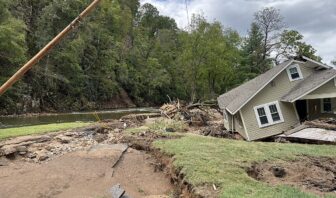Advocates applaud vote as a first step toward transparency, say much more is needed to protect public safety from the growing threat of crude oil trains
ANNAPOLIS — The Maryland House of Delegates voted 123 to 14 today to advance legislation (HB 1073) that would require state study of the risks of crude oil train accidents in Maryland. The bill, sponsored by Delegate Clarence Lam, also requires disclosure of the volume of crude oil being transported by trains in the state.
Since February, four crude oil trains have derailed and exploded across the U.S. and Canada, destroying one home, forcing evacuations, and causing fires that burned for days. Today’s vote comes as the oil industry targets the port of Baltimore as a new throughway for shipping highly flammable oil from the Bakken region of North Dakota to East Coast refineries.
“This bill is an important first step toward understanding the risks that so-called ‘bomb trains’ pose to the health and safety of Marylanders. We applaud Delegate Lam for his leadership, and the House of Delegate for voting overwhelmingly to pass this bill. It is time now for the Senate to follow suit,” said Jon Kenney, Maryland Community Organizer for the Chesapeake Climate Action Network.
“At the same time, further action is needed,” continued Kenney. “Communities are still left in the dark when it comes to basic information. For instance, since the amended bill does not require companies to disclose where these oil trains are traveling, communities have no way of knowing if trains are running through their neighborhoods.”
In Baltimore, Texas-based Targa Resources is currently seeking approval to establish a crude oil shipping facility in the community of Curtis Bay. This plan would create a market for sending millions of gallons of crude oil daily on rail lines through Baltimore, bringing serious safety risks to South Baltimore and the city as a whole.
“In Baltimore, action must be taken on the city level. The City Council must require a full Health Impact Assessment (HIA) before crude oil trains are running through the center of the city on their way to Curtis Bay, and should make that study available to the public,” added Kenney. “This study would give communities that live near rail lines the opportunity to understand how to handle an emergency evacuation should a derailment and disaster occur.”
“If only one car was to derail and explode, at minimum a half-mile evacuation radius would be necessary to prevent loss of life, while simultaneously spilling toxic crude oil into our waterways and the Inner Harbor, causing potentially irreversible damage to our drinking water, economy and ecosystem,” said Will Fadely, Baltimore Program Organizer for Clean Water Action. “Is Baltimore really ready for such a devastating possibility?”
To date, Maryland remains one of the last states in the country that has not yet disclosed crude oil train routes. Meanwhile, rail companies CSX and Norfolk Southern are in the middle of a controversial lawsuit to prevent the state of Maryland from disclosing the amounts and routes of Bakken crude travelling throughout the state.
According to the National Transportation Safety Board, a minimum of a half-mile evacuation radius would be necessary should one train car carrying explosive crude oil derail from the tracks.
Read a fact sheet about the threat of Crude by Rail through Baltimore here:
http://chesapeakeclimate.org/wp-content/uploads/2014/10/CCAN-Baltimore-Crude-Factsheet-1.pdf
Contact:
Jon Kenney, 301-385-4187, jon@chesapeakeclimate.org
Kelly Trout, 240-396-2022, kelly@chesapeakeclimate.org
###




